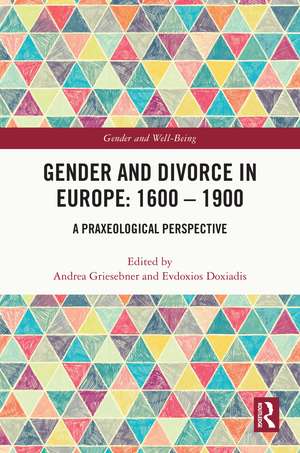Gender and Divorce in Europe: 1600 – 1900: A Praxeological Perspective: Gender and Well-Being
Editat de Andrea Griesebner, Evdoxios Doxiadisen Limba Engleză Hardback – 18 aug 2023
Religions and denominations also had different regulations regarding whether a divorce only ended marital obligations or also permitted remarriage during the lifetime of the divorced spouse. This book deals with predominantly handwritten documents of divorce proceedings from the British Isles to Western, Central, and Southeastern Europe, and from 1600 to the 1930s. The praxeological analysis reveals the arguments and strategies put forward to obtain or prevent divorce, as well as the social and, above all, economic conditions and arrangements connected with divorce. The contributions break new ground by combining previously often separate fields of research and regions of investigation. It makes clear that the gender order doesn’t always run along religious lines, as was too often assumed.
This book will be of interest to all scholars and students of economic, social, religious, cultural, legal, and gender history as well as gender and well-being in a broader sense.
Preț: 1048.41 lei
Preț vechi: 1103.59 lei
-5% Nou
Puncte Express: 1573
Preț estimativ în valută:
200.61€ • 210.05$ • 166.39£
200.61€ • 210.05$ • 166.39£
Carte disponibilă
Livrare economică 19 martie-02 aprilie
Livrare express 05-11 martie pentru 34.36 lei
Preluare comenzi: 021 569.72.76
Specificații
ISBN-13: 9781032369327
ISBN-10: 1032369329
Pagini: 250
Ilustrații: 4 Tables, black and white
Dimensiuni: 156 x 234 x 22 mm
Greutate: 0.53 kg
Ediția:1
Editura: Taylor & Francis
Colecția Routledge
Seria Gender and Well-Being
Locul publicării:Oxford, United Kingdom
ISBN-10: 1032369329
Pagini: 250
Ilustrații: 4 Tables, black and white
Dimensiuni: 156 x 234 x 22 mm
Greutate: 0.53 kg
Ediția:1
Editura: Taylor & Francis
Colecția Routledge
Seria Gender and Well-Being
Locul publicării:Oxford, United Kingdom
Public țintă
PostgraduateNotă biografică
Andrea Griesebner is a Professor in the Department of History at the University of Vienna. She served as vice chair from 2014 to 2017 and as chair of the department from 2017 to 2020. She obtained her PhD in 1998 and her Habilitation in 2001 in the field of Early Modern Gender and Criminal History at the University of Vienna. In recent years, her work and publications have focused on divorce and the consequences of divorce for Catholic couples. As principal investigator, she directed three third-party funded research projects on this topic. These were supported by the Austrian Science Fund and by the Anniversary Fund of the National Bank of Austria between 2011 and 2020.
Evdoxios Doxiadis is an Associate Professor in History at Simon Fraser University in Burnaby, Canada. His research is on Greek, Balkan, and Mediterranean history with a focus on the 18th and 19th centuries and a particular interest in questions of gender, law, state formation, and minorities. He has published two monographs: The Shackles of Modernity: Women, Property, and the Transition from the Ottoman Empire to the Modern Greek State 1750–1850 (2011) and State, Nationalism and the Jewish Communities of Modern Greece (2018), and a co-edited volume with Aimee Placas entitled Living under Austerity: Greek Society in Crisis (2018).
Evdoxios Doxiadis is an Associate Professor in History at Simon Fraser University in Burnaby, Canada. His research is on Greek, Balkan, and Mediterranean history with a focus on the 18th and 19th centuries and a particular interest in questions of gender, law, state formation, and minorities. He has published two monographs: The Shackles of Modernity: Women, Property, and the Transition from the Ottoman Empire to the Modern Greek State 1750–1850 (2011) and State, Nationalism and the Jewish Communities of Modern Greece (2018), and a co-edited volume with Aimee Placas entitled Living under Austerity: Greek Society in Crisis (2018).
Cuprins
1.Introduction. 2.Women and Work. Part I - Divorce from Bed and Board. 3.Separated Beds – Interwoven Property: Separation and Divorce in the Habsburg Monarchy between the mid-16th and the mid-19th Centuries. 4.Separating Persons and Property in Early Modern English Marriages. 5.Divorce in Early Modern Bilbao. 6.Judicial Separation and Its Material Effects in France during the 16th and 17th Centuries. 7.Interwoven Ecclesiastical and Civil Divorce Trials: A Venetian Case Study (1785). 8.Divorce during the Concordat at the Marriage Courts of Prague and Trent (1857–1868). 9.Material Matters: Dissolution of Economic Ties in the Context of Divorces in Rural Lower Austria in the 1920s and 1930s. Part II - Divorce with Dissolution of the Marriage. 10.Enduring Animosity: Negotiating Post-separation Conflicts in the German County of Lippe (17th and 18th Centuries). 11.The Indistinct Line between Marriage and Divorce: Ambiguous Nature of the Marital Status in the 17th Century Ottoman Empire. 12.The Influence of Islamic Law on Greek Orthodox Divorce under Ottoman Rule. 13.The Economy of Islamic Divorce in Habsburg Bosnia and Herzegovina (1878–1918). 14.New Possibilities – New Practices? Divorces of Jewish Couples under the Purview of the Austrian Civil Code in the 19th-Century: Provisions, Agreements, and Property Issues.
Descriere
Getting divorced and remarried are now common practices in European societies, even if the rules differ from one country to the next. Civil marriage law still echoes religious marriage law, which for centuries determined which persons could enter into marriage with each other and how validly contracted marriages could be ended.










